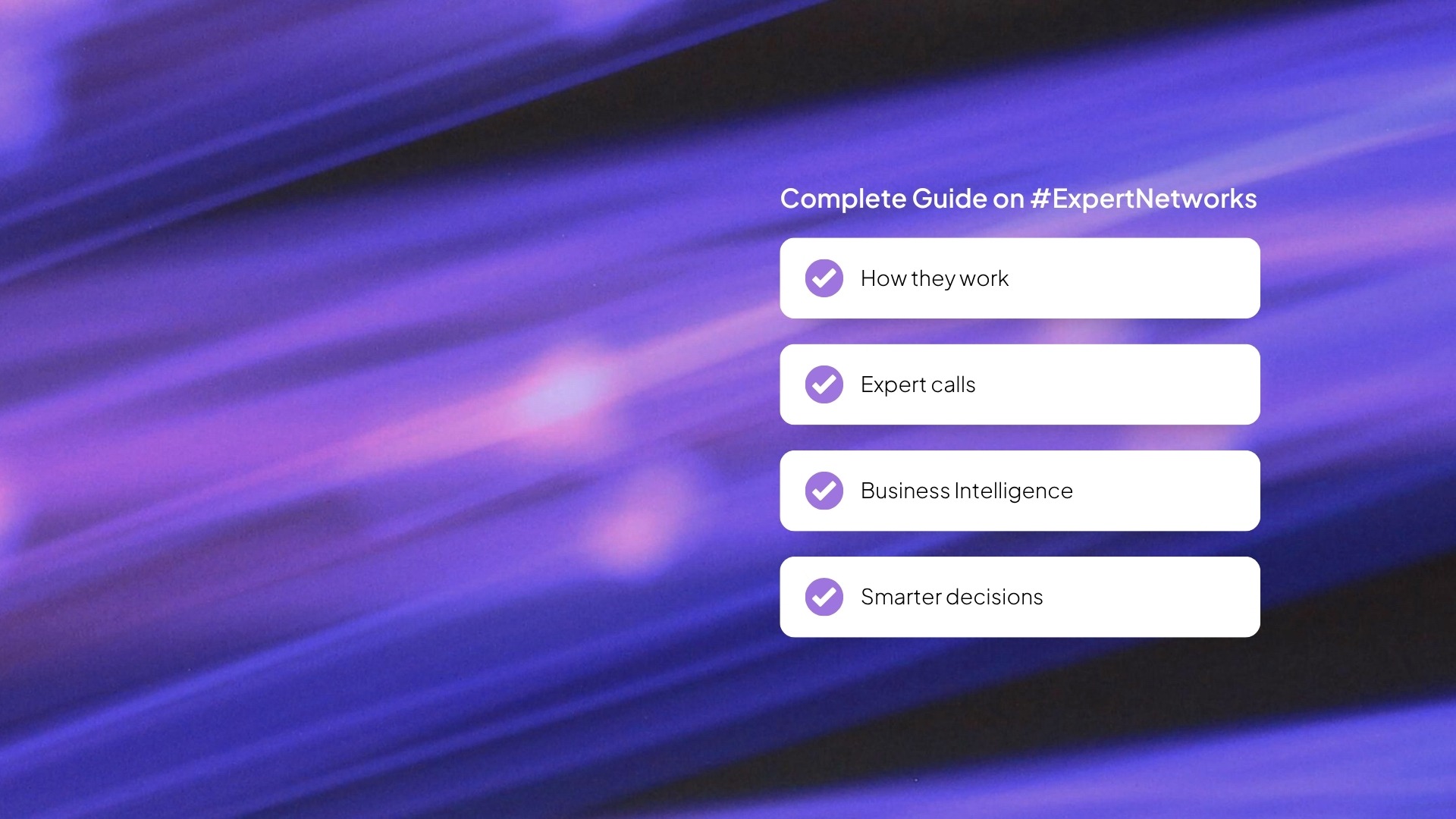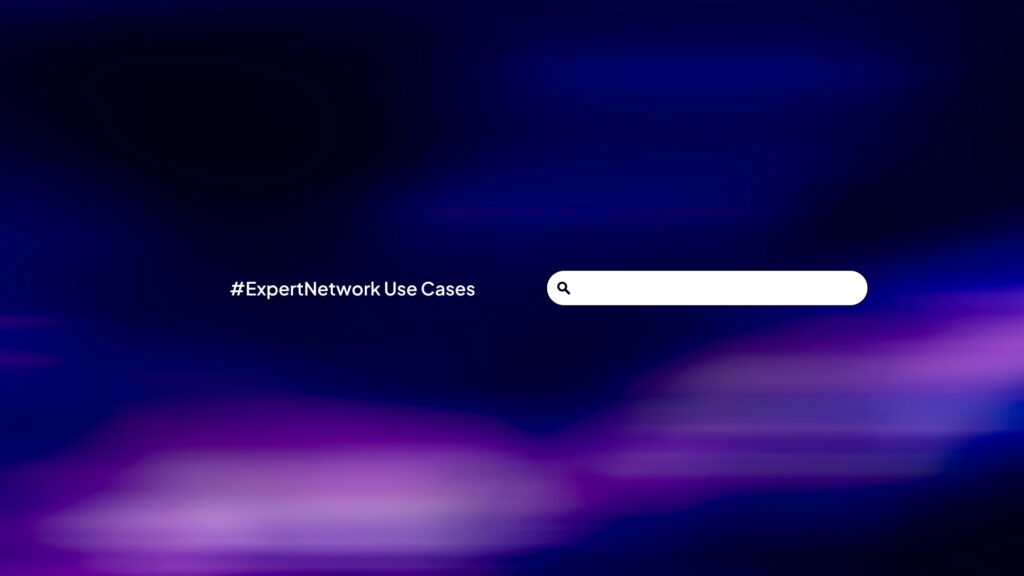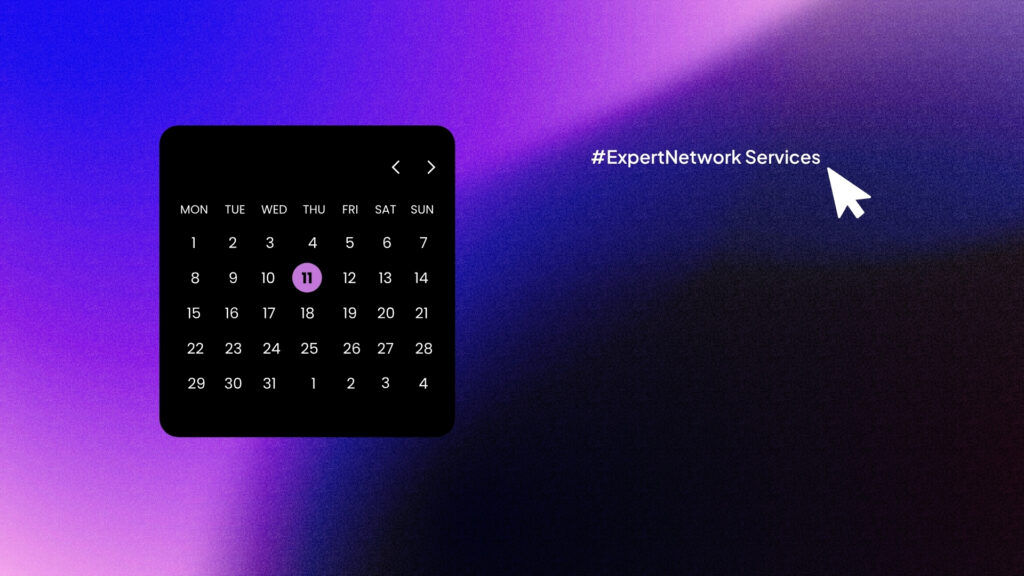Since 1998, expert networks have evolved into a $3 billion industry, and as a result, they have transformed how organizations access and apply specialized knowledge. Today, companies can quickly connect with subject-matter experts, from former C-level executives to on-the-ground specialists, who can provide accurate, up-to-date insights for critical decisions and knowledge gaps.
Gerson Lehrman Group (GLG) pioneered the concept by launching the first information services firm in 1998. Since then, organizations worldwide have turned to expert-sourcing firms such as Infoquest to benchmark competitors, validate investment ideas, and navigate complex markets. According to a 2011 TABB Group report, 81% of investment professionals said expert calls are a legitimate and value-adding part of investment due diligence.
Over time, the market has expanded rapidly. And by 2019, more than 130 of these information services providers were operating globally, allowing businesses to access specialized expertise across nearly every industry and region.
More recently, the 2024 merger between AlphaSense and Tegus has further streamlined access to expert insights, making knowledge both broader and more integrated than ever before.
In this guide, we explore how these platforms work in 2025, highlight their key benefits, and explain how organizations can leverage professional expertise to drive smarter, faster decisions.
What Are Expert Networks and Why They Matter in 2025
By 2025, these firms have become essential business resources, enabling organizations to connect directly with subject-matter experts across industries and geographies. These platforms fill critical knowledge gaps by linking companies with specialists who can explain complex topics, answer targeted questions, and provide strategic advice based on firsthand experience.

Definition and Evolution of Expert Networks
The early 2000s saw these knowledge platforms emerge as a well-laid-out service that bridged the knowledge gap between companies and industry specialists. These firms started by serving hedge funds and private equity firms, and they have expanded significantly by an average of 16% annual growth since 2015 [2]. The industry’s revenue exceeded $2.10 billion by 2022, with more than 120 firms operating worldwide.
How expert networks differ from traditional consulting
These platforms offer quick, targeted consultations that last 30–60 minutes, unlike traditional consulting projects with defined scopes and hefty price tags. Traditional consultants provide frameworks and general strategies, while these platforms connect businesses directly to individuals with hands-on experience in specific fields [4].
This on-demand model provides immediate insights at a fraction of the cost of traditional consulting. Companies find this especially valuable when they need to make time-sensitive decisions and require specialized answers. With that being said, these models still do not completely replace consultants, but rather complement them.
Industries that rely on expert networks

Financial Services
Hedge funds, private equity firms, and asset managers use these platforms to shape investment decisions and conduct due diligence.
Healthcare & Life Sciences
Pharmaceutical companies exploit networks to learn about drug development and market strategies from medical professionals.
Technology & Telecom
Companies ask industry experts about emerging trends, cybersecurity risks, and technology adoption patterns [2].
Consumer Goods & Retail
Brands seek direct insights on e-commerce shifts, modern trade, and channel strategy.
Industrial & Manufacturing
These businesses employ expert knowledge on supply chains, EV components, and factory automation.
These information services providers serve consulting firms, government agencies, startups, and corporations seeking competitive intelligence, expanding far beyond their traditional user base.
If you are looking into working with an expert network provider, then read our use case article for more information.
Core Services Offered by Expert Networks in 2025

Expert calls and custom recruiting
These platforms connect clients with industry specialists through one-on-one phone consultations that last between 30–60 minutes, sometimes more. Companies like Tegus conduct over 2,500 expert calls monthly. Others, like Infoquest, use rigorous custom recruiting processes to identify and pre-qualify experts based on client-specific screening questions. This custom recruiting approach helps ensure a precise match between expertise and project needs.
B2B surveys and market research
B2B surveys let organizations collect insights from hundreds of qualified experts at once. These surveys help companies measure competitors, assess market entry opportunities, optimize product features, and understand customer priorities. Some networks can deliver survey results in as little as 36 hours for time-sensitive projects [6].
Transcript Libraries and Knowledge Hubs
These providers maintain extensive transcript libraries that give clients searchable repositories of expert insights. Teams use these libraries for:
- Preparing for management meetings
- Educating teams on new markets
- Tracking industry developments
- Analyzing quarterly earnings
Written Deliverables and Questionnaires
They also offer written questionnaires and deliverables crafted by specialists, beyond verbal consultations. These include detailed reports, market reports, analysis documents, and written responses to specific questions. Such services give clients documented expertise they can share across teams and reference for future projects.
Keynote Speakers and Corporate Workshops
Networks link organizations with industry-leading speakers for corporate events, workshops, and conferences.
Long-Term Engagements & Contingency Workforce
Networks offer extended engagements where experts serve as ongoing advisors as part of an expert advisor network
for complex projects. These arrangements might include weekly, monthly, or quarterly consultations.
From Calls to Surveys.
We Cover It All.
Access Expertise Your Way
How Expert Networks Work: From Sourcing to Consultation
Expert Sourcing and Vetting Process
They actively find and bring in specialists from industries of all types through multiple channels. Their recruitment involves detailed background checks, credential verification, and proof of experience to confirm authenticity. Most networks keep large databases of professionals; other networks, such as Infoquest, prioritize custom sourcing experts for each engagement.
Networks review an expert’s qualifications, industry experience, and communication skills during the vetting phase. Most platforms use strict compliance protocols to stop any sharing of confidential or material non-public information (MNPI).
Step-by-Step: From Client Request to Expert Calls
- Client Request: Organizations submit detailed questions about their information needs, industry focus, and specific requirements.
- Expert Matching: Networks search their databases to find relevant specialists and/or other relevant databases. Many platforms use advanced algorithms and AI to make matches more precise. They look at expertise relevance and availability.
- Screening Process: Selected experts go through extra screening based on project needs. This step confirms that chosen professionals have the exact knowledge required.
- Engagement Setup: The network helps connect both parties through scheduling tools that work with work calendars.
- Knowledge Exchange: Experts share insights through one-on-one calls, panel discussions, or written reports during consultation.
Post-Call Feedback and Quality Improvement
Networks gather feedback from both sides after consultations to make future matches better. This improvement cycle helps maintain high-quality conversations and ensures clients receive valuable insights consistently.
Need the Right Expert?
Connect in under 2 hoursBusiness Models and Pricing Structures
Transaction-Based vs. Subscription-Based Models
These firms generate revenue through two main frameworks. Transaction-based models let clients pay only for consultations they need. This pay-per-use approach gives flexibility without long-term commitments. Therefore, organizations with occasional research needs use this ideal to avoid risks of unused credits or oversubscription.
Subscription-based structures need upfront payment for set access periods. These packages give predetermined “credits” when the contract starts. Much of the industry, especially 10-year-old networks like GLG and Maven Research, uses this model [14].

Credit Systems and Hourly Billing Explained
Credit systems serve as the standard currency in this industry, and clients buy credit packages that decrease as they use consultations. This system offers clear spending tracking and flexibility to add services like transcription and translation.
Clients should think about several factors when looking at credit systems:
- Package sizing and associated volume discounts
- Rollover policies for unused credits
- Rounding rules (calls generally rounded up to the nearest hour)
- Premium expert multipliers that may require additional credits
Key Pricing Factors and Client Considerations
Hourly rates provide another option. The average fee sits at $950 per hour and rises to $1,150 for premium experts, which is about 20% lower than traditional firms that charge multiple credits per hour.
Many platforms now offer features that boost client experience:
- 15-minute grace periods for unsatisfactory calls
- 30-minute calls at 75% of standard costs
- 3-minute rounding down to the nearest 15-minute increment
- 15-minute billing increments for extended calls
These pricing breakthroughs show the expert network cost and how the industry welcomes greater transparency and client-focused models.
Top Expert Network Companies and Their Strengths
The industry in 2025 includes several types of providers. Each type gives clients unique benefits when they need specialized knowledge.

Traditional Expert Networks: GLG and Third Bridge
Gerson Lehrman Group (GLG)
Started it all as the first expert network in 1998. GLG now has over 900,000 vetted professionals in more than 150 countries. The company helps corporations, investors, consultancies, and government agencies. They excel at connecting clients with industry leaders and former executives through phone calls. These calls help businesses get quick answers to their pressing questions. GLG also provides pre-recorded expert interviews and large-scale surveys.
Third Bridge
Stands out by focusing on qualitative research and investor-led content. They combine unbiased human insights with unique content in their research solutions [18]. The company’s services include Connections for direct expert access, Forum – “the biggest archive of high-quality expert interviews in the world,” and Maps that show public and private company value chains visually [18].
Guidepoint
One of the largest global firms, Guidepoint, operates a database of over 1 million experts spanning 200 industries. Known for its flexibility, it provides custom solutions across expert calls, quantitative surveys, data products, and long-term engagements. Guidepoint’s client base includes leading hedge funds, corporates, and consulting firms. Their “Guidepoint Qsight” platform also delivers analytics-driven insights to support faster decision-making.
AlphaSights
Recognized for its speed and scale, AlphaSights connects clients to experts within hours. With offices across major financial hubs, the company focuses on serving investment and advisory professionals who need rapid access to firsthand expertise. AlphaSights combines human sourcing teams with proprietary technology to identify and match the most relevant experts quickly, ensuring high match accuracy for time-sensitive projects.
Infoquest
Has quickly become the leading Middle East–built expert network, bridging global decision-makers with regional and international expertise. Infoquest serves many corporate clients, goverment clients and more than 80% of international consulting firms. The firm’s custom-sourcing model stands apart from traditional database-driven networks; experts are recruited fresh for every project, ensuring precise, context-specific matches. With 800+ completed projects and a 98% client satisfaction rate, Infoquest represents the next generation of expert networks built around speed, precision, and regional intelligence.
AI-Powered Platforms: AlphaSense and Tegus
A major industry shift happened when AlphaSense bought Tegus in 2024 for $930 million. The combined company is now worth about $4 billion. This deal brought together two powerhouses: AlphaSense’s AI-powered market intelligence platform and Tegus’ expert research, private company content, and financial data [3].
AlphaSense gives access to more than 10,000 premium sources, including trade journals, SEC filings, and broker research. Tegus adds its library of over 100,000 expert call transcripts, financial coverage of 4,000+ public companies, and industry comparisons in more than 50 sectors. Their AskTegus feature uses AI to help investors quickly find insights in their huge database.
Aggregator Networks: Inex One’s Marketplace Model
Inex One brings a fresh approach with its marketplace model. They combine over 30 expert networks and survey vendors into one platform [21]. Clients can now reach experts from multiple networks at once instead of using just one provider. Research requests go out to different firms that compete to find the best expert match. This leads to faster responses and better prices [17].
Best Expert Networks in 2025: A Comparative Overview
Your choice of a provider in 2025 will depend on your business needs, research goals, and target regions. Let’s look at how the major providers stack up against each other.

GLG vs. AlphaSense-Tegus: Data Depth and Pricing
GLG still leads the pack as the pioneer with access to 900,000+ experts across 150+ countries. This traditional network shines at direct expert consultations but comes with premium pricing at $1,350 per hour. AlphaSense and Tegus merged in 2024 to create a $4 billion powerhouse. Their combined platform now gives you 10,000+ content sources through AlphaSense and more than 100,000 expert call transcripts from Tegus. While GLG takes a more transaction-based approach, the AlphaSense-Tegus platform uses AI-powered search to find insights in their big content libraries.
Guidepoint, Third Bridge, and AlphaSights: Key Differentiators
Third Bridge
Stands out with its Forum product, a huge library of interview transcripts that covers 4,000 global companies. They do more than 10,000 interviews each year and focus on quality research for investment professionals.
AlphaSights
Is all about speed and can connect you with experts in just hours. They help with expert calls, surveys, and research projects. Their teams handle everything from writing surveys to analyzing results.
Guidepoint
Goes head-to-head with GLG but offers more flexible options at better rates through their million-expert network.
Infoquest: The Emerging Next-Generation Expert Network
Infoquest represents the next evolution of the expert network model, built for speed, precision, and contextual depth. Founded in 2020 and headquartered in Dubai and Beirut, the firm serves hundreds of corporations and over 80% of international consulting firms active in the GCC.
Unlike database-heavy incumbents, Infoquest uses a custom-sourcing model, recruiting experts fresh for each project to ensure a perfect fit for every engagement. The company delivers verified experts in under 2 hours, providing unmatched agility in fast-moving markets.
Partner with Infoquest for
Speed and Precision
Contact Us
Emerging Expert Networks in the Middle East and GCC
Infoquest’s Growth Journey in the Region
Infoquest, has quickly become the top local expert network in the Middle East. From their offices in Dubai and Beirut, they work with hundreds of companies and 80% of international consulting firms in the region.

Saudi Arabia’s Vision 2030 and Regional Demand for Expertise
They excel because they know the local market well, especially in Saudi Arabia, where Vision 2030’s big changes mean companies just need more expert knowledge. The industry keeps growing in the GCC, and more regional experts are joining these networks to share what they know.
Compliance, Cost, and ROI Considerations
Compliance Frameworks and MNPI Safeguards
Leading networks prioritize robust compliance to prevent the sharing of material non-public information (MNPI). Their systems include non-disclosure agreements, checks for conflicts of interest, and training about insider trading rules. They also apply multiple layers of protection. GLG has more than 50 compliance professionals on staff and makes experts complete industry-specific training in 20 languages.
Experts learn what topics they can discuss, which helps prevent accidental leaks of private information. Investment firms face even stricter rules.
Maximizing ROI Through Expert Networks
They save companies much more money than traditional consulting. Businesses typically spend 50-70% less than they would on full-time consultants in comparison to expert network consultants [31]. These services also speed up how quickly companies can get insights by 40-60%, which leads to faster decisions. Although they do not necessarily replace consultants.
Trends Shaping the Future of Expert Networks
Growth of Expert Networks in Emerging Regions
The Middle East leads as one of the most dynamic regions in this industry. Saudi Arabia shows remarkable potential. The Saudi Vision 2030 transformation plans create a strong need for expert insights. The global expert network sector has grown 16% each year since 2015. MEA professionals join these networks in growing numbers as they’re eager to share their regional point of view on the global stage.
Integration of AI and Real-Time Data Insights
AI has reshaped the scene for expert networks. Machine learning algorithms boost expert recommendations, and they streamline processes by automating expert discovery.
Moreover, natural language processing filters responses for relevance [33] to which these tools have made data analysis faster by over 300% and improved information accuracy [34]. Smart Summaries now give immediate genAI overviews of expert call transcripts. Sentiment Analysis learns about language nuances in expert conversations [7].
The Shift Toward Predictive and Automated Expertise
Immediate monitoring tools help these networks track market trends through social media, news outlets, and other data sources. Pattern recognition studies an expert’s background and past consultations to find ideal matches. Yes, AI-driven tech has indeed cut expert identification and recruitment time by 50%, and these firms now work as trend data banks as they pool anonymized insights from countless consultations to spot broader market patterns and economic changes.

Conclusion
Why Expert Networks Remain Indispensable
They have evolved from niche services into essential business tools since 1998. They connect organizations with specialized knowledge sources in almost every industry, and currently valued at $1.3 billion, it is growing faster than ever as it adapts to business needs and expands globally.
Companies that leverage these platforms gain competitive advantages through quick access to specialized insights. This becomes especially important when you have time-sensitive decisions that need deep domain expertise.
Future Outlook for the Expert Network Industry
AI-powered platforms like AlphaSense-Tegus now use machine learning to match clients with the right experts and extract insights from massive content databases. This innovation has cut expert identification time in half and made data analysis up to three times faster.
At the same time, the industry’s footprint is expanding rapidly, especially across emerging regions. The Middle East stands out, driven by Saudi Arabia’s Vision 2030 and the growing need for specialized knowledge. Local firms such as Infoquest have stepped up to meet this demand, combining global reach with a deep understanding of regional markets.
But as access to expertise scales, so does the responsibility to stay compliant. Leading networks now enforce strict safeguards, from non-disclosure agreements and conflict-of-interest checks to structured compliance training, to prevent the sharing of material non-public information and uphold ethical standards.
Looking ahead, expert networks will remain a cornerstone of modern decision-making. Their ability to deliver specialized insights quickly, supported by advancing technology and wider global coverage, keeps them indispensable. Organizations that integrate these knowledge platforms into their workflows make faster, sharper, and more confident decisions, ready to navigate the complexities of business with clarity and precision.
FAQs
Q1. How are expert networks evolving in 2025?
Expert networks are expanding their offerings beyond expert calls to include additional content sets like market research reports, transcripts, and AI-powered insights. This evolution allows investors and corporate professionals to conduct more comprehensive research by combining expert consultations with other premium content sources.
Q2. Which companies are considered the top expert networks in 2025?
The “Big Five” expert networks leading the industry are AlphaSense-Tegus (following their merger), Gerson Lehrman Group (GLG), Third Bridge, AlphaSights, and Guidepoint. In addition, Infoquest has emerged as a leading regional player in the Middle East and GCC and has grown globally as well, known for its speed, precision, and ability to custom-source experts in markets often underserved by global networks.
Q3. What methods do expert networks use to identify and recruit experts?
They maintain extensive databases of pre-vetted professionals across various industries. They also employ advanced algorithms and AI to match client needs with relevant experts. Additionally, networks actively recruit new specialists through multiple channels, conducting thorough background checks and credential verifications to ensure authenticity and expertise.
Q4. Why has the expert network industry experienced rapid growth?
The industry’s growth is driven by businesses’ increasing need for quick access to specialized knowledge in niche areas, from emerging technologies to specific markets. Globalization and the rise of remote work have also expanded the pool of accessible experts worldwide, making it easier for companies to tap into diverse expertise for informed decision-making.
Q5. How do expert network firms ensure compliance and prevent the sharing of confidential information?
They implement robust compliance frameworks that include non-disclosure agreements, conflict of interest checks, and comprehensive training on insider trading regulations. Many platforms use multi-layered safeguards, such as call recording systems and supervisor presence during consultations. Experts are also briefed on permissible discussion topics to prevent accidental disclosure of material non-public information.


